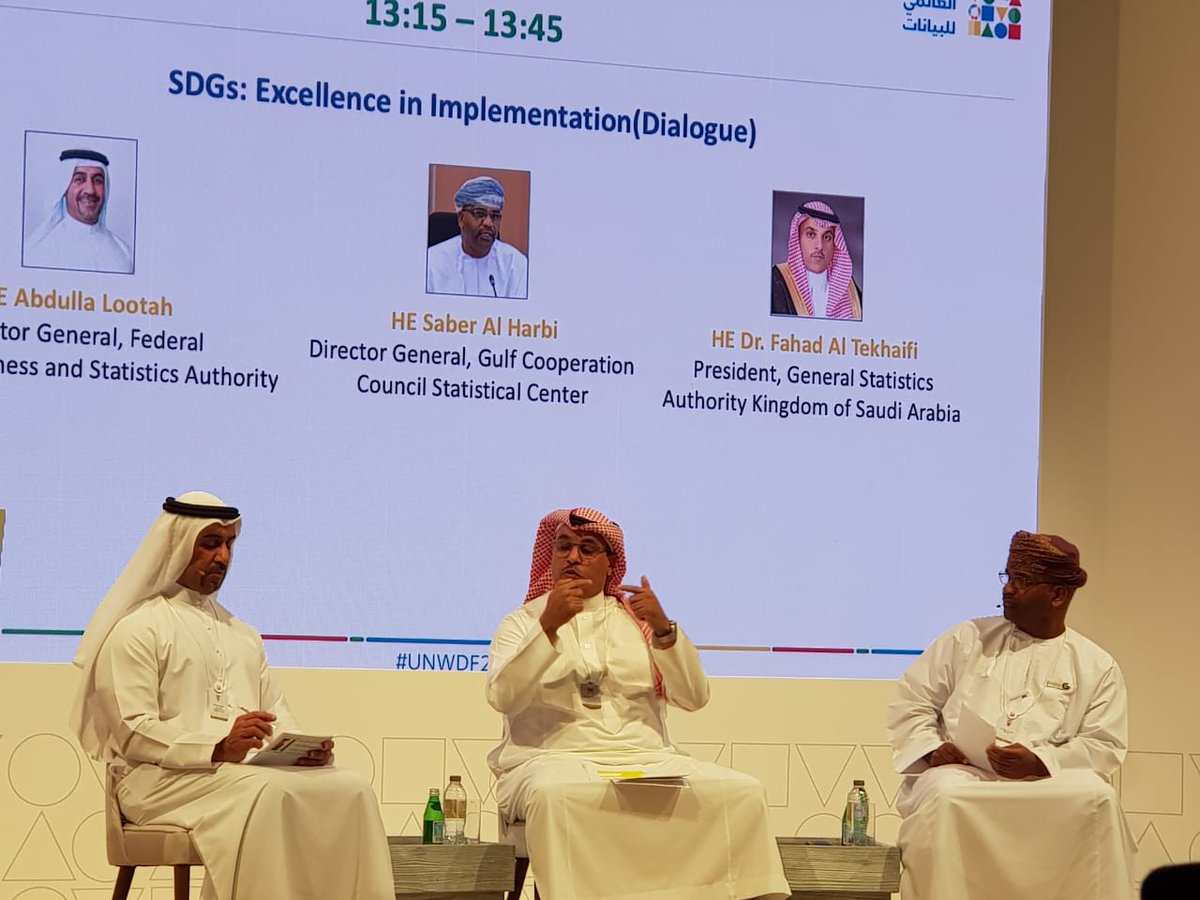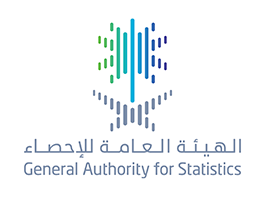
انعقاد الاجتماع الثالث لِلَّجنة التنسيقية الدائمة بمشاركة 17 جهة حكومية
To develop the statistical departments
The coordination committee is holding its third meeting with 17 governmental entities
The third meeting of the coordination committee was held on Wednesday 21/2/1440H corresponding 31/10/2018 at the General Authority for Statistics (GASTAT) head office to facilitate the exchange of data and information with various government agencies.
The official spokesman of the General Authority for Statistics (GASTAT), Taiseer Almofarrej, explained that the coordination teams discussed several topics, including the program of developing the statistical departments which aims at establishing organizational rules and fundamentals to found statistical departments in the governmental entities. Furthermore, it aims to build an official statistical system and to make the statistics, information, and indicators basic parts of the governmental work to enhance the quality of statistical work in Saudi Arabia. The mechanism of classifying government statistical units was also discussed in the meeting. Moreover, the committee reviewed the statistical works carried out during the last period.
On the other hand, Almofarrej said that the coordination committee of the General Authority for Statistics includes a number of representatives including the Saudi Arabian Monetary Agency , General Authority for Investment, Ministry of Health, Ministry of Environment, Water and Agriculture, Saudi Customs, Ministry of Housing, Ministry of Trade and Investment, Ministry of Education, Ministry of Justice, Ministry of Municipal and Rural Affairs, Ministry of Finance, Ministry of Energy, Industry and Mineral Resources, Ministry of Communications and Information Technology, Ministry of Labor and Social Development, National Information Center, Ministry of Economy and Planning, and Saudi Post.
It is worth mentioning that the coordination committee was formed permanently to coordinate the statistical work between the General Authority for Statistics and related entities, in accordance with the Ministers Cabinet resolution number (11) dated 13/1/1437 H of the authority organization, which aimed at activating and organizing the statistical work through the establishment of a comprehensive, accurate and unified statistical system, in addition to the follow-up of its implementation. It also develops the plans and programs necessary for fulfilling statistical needs; in order to serve the developmental plans, scientific research, and other activities.

التخيفي: المملكة تسعى لتكون من أوائل الدول عالميًا في تحقيق أهداف التنمية المستدامة من خلال بناء مؤشرات إحصائية وتطوير سياسات تنموية
During the Second UN World Data Forum
Al Tekhaifi: Saudi Arabia seeks to be one of the first countries in the world to achieve the Sustainable Development Goals through building statistical indicators and creating development policies
The General Authority for Statistics (GASTAT) concluded its participation in the second United Nations Data Forum hosted by the United Arab Emirates from 22 - 24 October 2018, under the patronage of H.H. Shaikh Mohammed bin Rashid Al Maktoum, the Vice President and Prime Minister of the United Arab Emirates and the Ruler of Dubai. The forum was held with the participation of a group of leaders, decision-makers and more than 2500 experts and specialists in the field of data from more than 120 countries in the world.
H.E. Dr Fahad Al Tekhaifi, the President of the General Authority for Statistics, congratulated the Federal Competitiveness and Statistics Authority in the United Arab Emirates on the success of hosting this international statistical event. He praised the achievement of the session’s goals through the wide participation of the countries, organizations, government systems, and research and academic society. Al Tekhaifi stressed that the participation of GASTAT in the UN World Data Forum of 2018 – which is held for the first time in the Gulf region in Dubai – comes within GASTAT plan to benefit from the best international practices in the data field, communicate with the international organizations and strengthen the partnerships with them. In addition, the topics of the forum are one the important topics for all statistics systems especially in view of the transformation in the region from depending on gas and oil to an economy based on diversity for a sustainable development. The three-day forum discussed the exploitation of the information revolution for a sustainable development. Moreover, the forum discussed improving the use of data and statistics to achieve change towards a better future for human societies in line with the Sustainable development goals 2030.
GASTAT president pointed that Saudi Arabia presented its first voluntary national report at the high-level political forum concerned with the sustainable development last July at the UN headquarters in New York despite it being voluntary, believing in the importance of pioneering in sustainable development for the national, regional and global transformation. Saudi Arabia has made rapid progress in achieving the goals of sustainable development, which confirms the keenness of the leadership on this, led by the Custodian of the Two Holy Mosques King Salman Bin Abdul Aziz Al Saud, His Royal Highness Prince Mohammed bin Salman bin Abdulaziz, Crown Prince, Deputy Prime Minister and Minister of Defense. Saudi Arabia as a member of the United Nations General Assembly seeks to be one of the first countries to achieve the Sustainable Development Goals. Since the adoption of the goals, Saudi Arabia developed work mechanisms to ensure that the Sustainable Development Goals are aligned with the 2030 Saudi Vision as well as other national strategies and programs. Saudi Arabia developed a clear governance for the responsibilities and roles assigned to all relevant government sectors. GASTAT is considered the official body for building the indicators of sustainable development in Saudi Arabia.
Al Tekhaifi explained through his participation in one of the forum sessions that Saudi Arabia dealt with the sustainable development as goals and indicators in an effective way through three parallel tracks (Legislative, coordination, and technical). In the legislative track, a Royal Decree was issued assigning His Excellency the Minister of economy and Planning, the Chairman of the Board of Directors in GASTAT, to follow-up the profile of sustainable development goals beyond 2015. In addition, the Ministers cabinet approved the organization of GASTAT as the only official reference to implement the statistical work in all fields, as well as the entity responsible of producing statistical data and information at the national and international level. In the coordination track, a number of Statistics’ coordination committees have been formed with the participation of relevant government entities in different social, economic and environmental fields. In the technical track, GASTAT works with the participation of government entities on the national statistical data program “Masdar” which is a program that aims to to build a comprehensive national statistical database in which all statistical data from various internal and external sources are gathered to produce the categories, indicators and analyses needed by data users and analysts inside and outside the GASTAT to use it as a statistical reference to support decision making and the development of various development plans.
It is worth mentioning that the UN World Data Forum is a global platform for official statistics, and a collaborative environment for research and development of this area, using working models of global task forces for a number of statistical projects, in partnership with technology companies, data providers and academia in order to invest the digital data as inputs in the production of a reliable statistics, and make it available to serve the community in various fields.
GASTAT: Real-Estate Prices Index Decreased During Q3, 2018
The index includes housing, commercial and agricultural sectors
GASTAT: Real-Estate Prices Index Decreased During Q3, 2018
The General Authority for Statistics (GASTAT) released the report of Real Estate Price index for the third quarter, 2018 on the official website of the Authority www.stats.gov.sa
The real-estate price index has recorded a decline by (1.6%), compared to the previous quarter Q2 2018, where the indicator of the real estate price index reached (82.3) in the third quarter of 2018, compared to (83.6) in the second quarter of 2018. This decline can be attributed to the decrease in the main sectors composing the indicator: the housing sector (2.1%), the commercial sector (0.5%), and the agricultural sector (0.1%) compared to the second quarter of the current year.
At the level of the housing sector, the third quarter of 2018 witnessed a decline in residential lands by (2.1%), compared to the previous quarter, where the villas, apartments and houses decreased by (1.4%), (2.0%), and (0.3%) respectively. On the other hand, residential buildings increased by (0.2%). Regarding the commercial sector, commercial plots decreased by (0.5%), compared to the previous quarter. However, the agricultural sector witnessed a decrease by (0.1%) in agricultural lands.
Additionally, the index is based on the data records about real-estate’s transactions available at the Ministry of Justice, and it is an important tool to support economic and statistical decision makers regarding the changes of property prices and future forecasts during different periods of time. The index has three main sectors consisting of several types of real estate: housing sector which includes the following (plot of land, building, villa, apartment and house), commercial sector includes (plot of land, building, exhibition/ shop or commercial center), and the agricultural sector with only one category which is the agricultural land.
It is worth mentioning that the real estate price index aims at finding accurate real estate statistical indicators that measure real estate market in Saudi Arabia according to universally recognized scientific norms and standards, and filling the gap of data in real estate sector. It is considered an essential tool to support entities which make economic decisions in this field, and to contribute to a development process in the real estate sector in order to achieve the vision of 2030.

الهيئة العامة للإحصاء تصدر نتائج مسح المال والتأمين 2017م
With total operating revenues of 162 billion SAR
GASTAT Releases the Results of the Finance and Insurance Survey 2017
The General Authority for Statistics (GASTAT) released the results of " Finance and Insurance Survey (2017) " , which conducted annually by the Authority, on its official website www.stats.gov.sa . This survey is an important source for presenting and analyzing the economic data of finance and insurance establishments, such as employees, compensations paid to them, other expenses, revenues and capital formations.
The survey results showed that the number of establishments engaged in the finance and insurance activity increased by 1.14% in 2017, compared to the previous year 2016. However, the total number of establishments engaged in the finance and insurance activities amounted to 6,664 establishments distributed among 14 sub-activities. The sub-activities include banking and holding companies, financial leasing, other loan- granting forms, insurance, financial market management, securities contracts, insurance agents and brokers, money management as well as other activities.
Furthermore, finance and insurance survey results revealed that the total number of employees in this sector reached 113,728 employees, where 82,308 of them are Saudi employees and 31,420 are Non-Saudi employees. Therefore, the number of Saudi employees in finance and insurance establishments increased by 3.32% during 2017 compared to the previous year 2016.
According to the finance and insurance survey results, the total amount paid to finance and insurance establishment's employees for wages, benefits and allowances made up 22 billion and 920 million SAR during 2017.
Additionally, the results of the survey indicated that the operating revenues of the establishments engaged in the finance and insurance activity increased during 2017 by 10.3%, compared to the last year 2016. It should be noted that the total number of revenues reached about 162 billion SAR, while the total number of operating expenses of these establishments was approximately 47 billion and 312 million SAR in the year of 2017.
The finance and insurance survey was conducted based on an evident methodology according to the international standards. The methodology is to study the establishments that carry out their main operations in finance and insurance field in private and public sectors.
It is worth mentioning that the finance and insurance survey is important in providing detailed data on finance and insurance activity at the level of Saudi Arabia. These data contribute to measuring the participation of this activity in the economic development process, in addition to providing the basic data necessary for preparing and composing national accounts.
